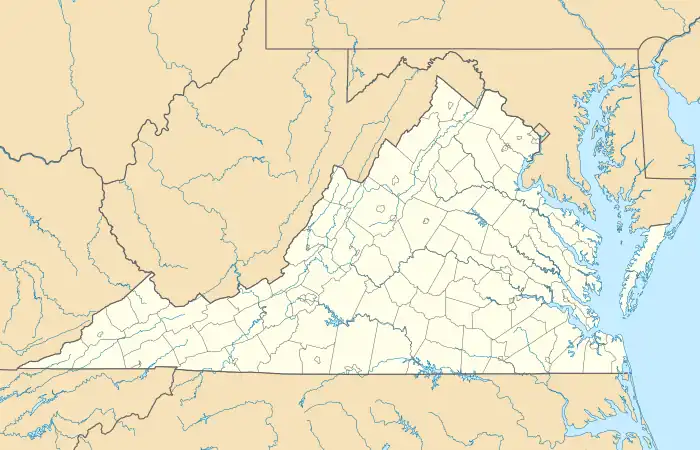Toano, Virginia
Toano, formerly Burnt Ordinary, is an unincorporated community in James City County, Virginia, United States. It is in Virginia’s 1st Congressional District.
Toano, Virginia | |
|---|---|
 Former bank in the Toano Historic District | |
 Toano  Toano | |
| Coordinates: 37°22′48″N 76°48′15″W | |
| Country | United States |
| State | Virginia |
| County | James City |
| Time zone | UTC−05:00 (Eastern (EST)) |
| • Summer (DST) | UTC−04:00 (EDT) |
| ZIP Codes | 23168 |
History
Toano was established in the late 19th century in western James City County at the former site of "Burnt Ordinary", which was named in the 18th century for a roadside tavern that had burned down. The word Toano comes from a Native American word meaning "high ground".
In 1881, the Peninsula Extension of the Chesapeake and Ohio Railway (C&O) was built through the area from Richmond to reach the coal piers on Hampton Roads at the new city of Newport News. The C&O built a railroad station at Toano.
Toano was located on the old Richmond-Williamsburg Stage Road, which is U.S. Route 60 in modern times. Interstate 64 was built through the area in the 1970s, and passes nearby. Exit 227, located at the intersection of State Route 30, is signed "Toano-West Point".
Toano is close to major Historic Triangle attractions such as Colonial Williamsburg, and the Busch Gardens Williamsburg and Water Country USA theme parks. Smaller attractions at Lakewood Trails and Go-Karts Plus are also located nearby.
Toano's history is recalled on a Virginia Historical Marker nearby, which reads:[1]
First called John Lewis's Ordinary and then Fox's, Burnt Ordinary received its name in Jan. 1780 when, according to Virginia Gazette, Fox's Ordinary burned to the ground. Later, in Oct. 1781, when the French army's wagon train passed by, Alexander Berthier wrote that "two old chimneys" stood here in the fork of the road. Also in 1781, Samuel DeWitt, George Washington's cartographer, noted the site of the "Burnt Brick Ordinary" on one of his maps. Elements of Lafayette's army camped two miles south of here at Chickahominy Church after the Battle of Green Spring on 6 July 1781.
Places in or near Toano that are listed on the National Register of Historic Places include: Chickahominy Shipyard Archeological Site, Hickory Neck Church, Stone House Site, White Hall (Toano, Virginia), and Windsor Castle (Toano, Virginia).
A local landmark is a 7-foot (2.1 m) waving tiger statue in front of a service station that used to be owned by Exxon at Anderson's Corner. In 1990, the oil company attempted to replace it no longer conformed to the company's specifications.[2] The town rallied to save it, and the company allowed it to stay. A few businesses have adopted the tiger moniker, and the landmark inspired the tiger mascot for the Toano Middle School.

Houses of worship in or near Toano include Hickory Neck Episcopal Church, which traces its roots to 1734, and Mt. Vernon United Methodist Church, which dates to 1887.
References
- "Department of Historic Resources". vcris.dhr.virginia.gov. Retrieved 2 November 2018.
- "The Free Lance-Star - Google News Archive Search". Retrieved 13 February 2016.
External links
- James City County (official website)
- Williamsburg-James City County Public Schools Archived 2018-08-11 at the Wayback Machine
- Williamsburg Regional Library system
- Toano-Norge Times local newspaper website
